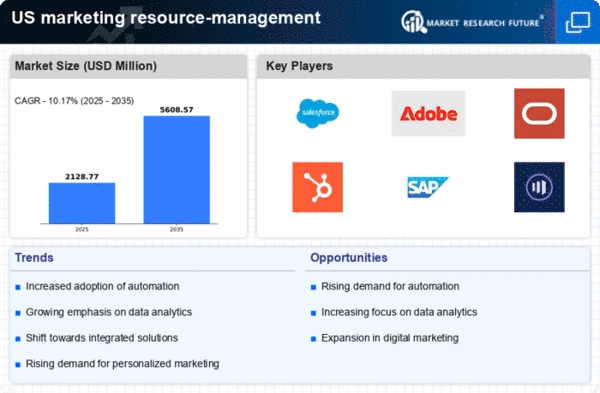Rise of Remote Work Dynamics
the marketing resource-management market is adapting to the landscape of remote work, which has become a defining characteristic of the modern workplace. As organizations embrace flexible work arrangements, the need for tools that support remote collaboration and project management has surged. This shift has led to an increased focus on cloud-based solutions that enable teams to work together effectively, regardless of their physical location. In 2025, it is estimated that around 30% of marketing teams will operate remotely, necessitating robust resource-management systems that can accommodate this trend. Consequently, the marketing resource-management market is likely to experience a rise in demand for features that enhance communication and project tracking, ensuring that marketing initiatives remain on track despite geographical barriers.
Emergence of Agile Marketing Practices
the marketing resource-management market is experiencing a shift towards agile marketing practices, which prioritize flexibility and responsiveness in marketing strategies. This approach allows organizations to adapt quickly to changing market conditions and consumer preferences. As a result, there is an increasing demand for resource-management tools that support agile methodologies, enabling teams to pivot their strategies in real-time. In 2025, it is anticipated that around 40% of marketing teams will adopt agile practices, driving the need for solutions that facilitate rapid project execution and iterative planning. This trend suggests that the marketing resource-management market will continue to evolve, with a focus on tools that enhance adaptability and foster innovation in marketing campaigns.
Increased Focus on Performance Metrics
In the marketing resource-management market, there is a growing emphasis on performance metrics and analytics. Organizations are increasingly recognizing the importance of data-driven insights to inform their marketing strategies. This trend is reflected in the allocation of budgets, with approximately 25% of marketing expenditures now directed towards analytics tools and performance measurement systems. As companies strive to maximize their return on investment (ROI), the demand for solutions that provide real-time data and actionable insights is likely to intensify. The ability to track campaign performance and resource utilization effectively is becoming a critical factor in decision-making processes. Thus, the marketing resource-management market is likely to expand as businesses seek tools that facilitate comprehensive performance analysis.
Growing Demand for Integrated Solutions
The marketing resource-management market is experiencing a notable shift towards integrated solutions that streamline various marketing functions. Companies are increasingly seeking platforms that consolidate project management, budgeting, and analytics into a single interface. This trend is driven by the need for efficiency and the desire to reduce operational costs. In 2025, the market is projected to reach approximately $5 billion, reflecting a compound annual growth rate (CAGR) of around 12%. Organizations recognize that integrated solutions can enhance collaboration and improve resource allocation, thereby optimizing marketing efforts. As businesses strive to remain competitive, the demand for comprehensive tools that facilitate seamless integration across marketing channels is likely to grow, further propelling the marketing resource-management market forward.
Growing Importance of Compliance and Security
In the marketing resource-management market, compliance and security have emerged as critical considerations for organizations. With the increasing scrutiny on data privacy and regulatory requirements, businesses are prioritizing solutions that ensure compliance with industry standards. This trend is particularly relevant in sectors such as finance and healthcare, where data protection is paramount. As of 2025, it is estimated that compliance-related expenditures will account for approximately 15% of marketing budgets. Consequently, the marketing resource-management market is likely to experience a rise in demand for tools that incorporate robust security features and compliance tracking capabilities. Organizations are seeking solutions that not only enhance marketing efficiency but also safeguard sensitive information, thereby reinforcing the importance of compliance in marketing resource management.
















